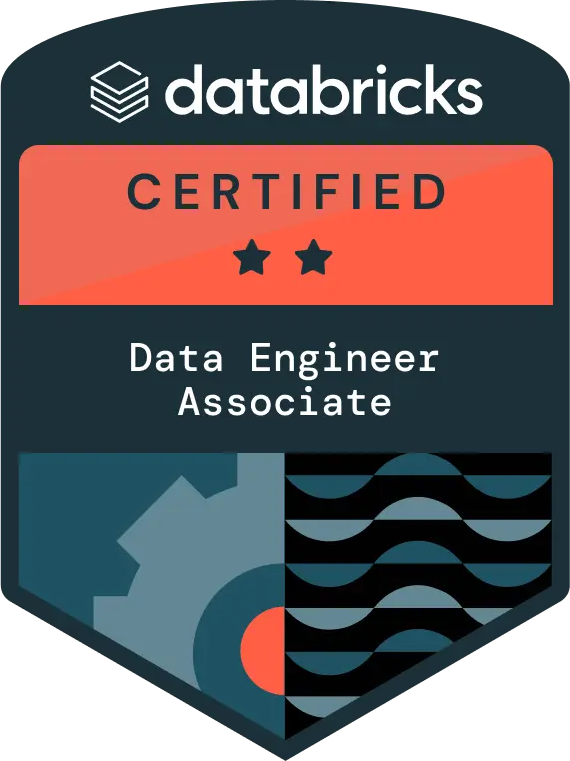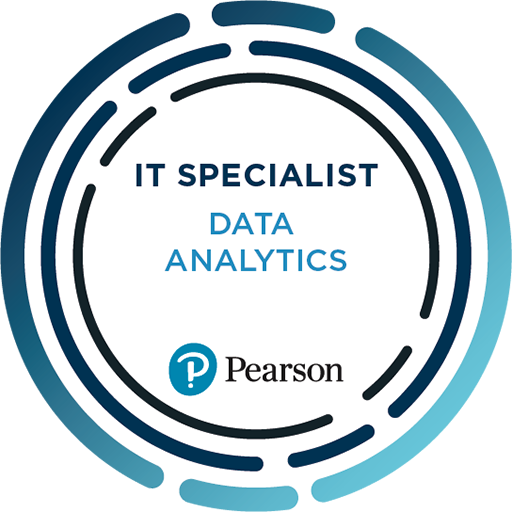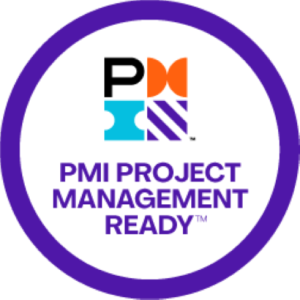On-campus / Online classes live
October 2025
15 months
We prepare you for certification

 Learning paths
Learning pathsFree access to further training
Presentation of the curriculum, work tools, and how the programme and group operate.
Learn how to use industry-leading tools
This module focuses on introducing the fundamentals of programming using Python, a widely used and versatile language that is ideal for beginners and professionals alike. Python is used in web applications, data analysis, artificial intelligence, task automation and much more. Its simple and readable syntax makes it easy to learn and develop, providing a solid foundation for the rest of the program.
Modules:
This module provides a comprehensive introduction to the world of databases, covering everything from basic modelling principles to practical implementation using SQL. Through this course, students will learn how to define, manipulate and manage data within structured database systems, using SQL as the primary tool. The goal is to equip students with the skills necessary to design efficient databases and perform complex queries to support business decisions.
Modules:
This module focuses on data transformation and data modelling, essential techniques for turning raw data into valuable information in business contexts. Through methodologies such as ETL, ELT, and EL, and using modelling standards such as dimensional modelling and Data Vault, students will learn how to create sophisticated data products. In addition, the course will address the use of modern tools for the orchestration of data flows and the creation of applications and APIs that enable the effective exploitation of transformed data.
Modules:
The module is designed to provide students with an in-depth understanding of how to transform complex data into clear, effective and actionable visualisations.
Modules:
Advanced data visualisation is essential for turning complex information into clear insights that support strategic decision making in a business environment. In this module, the focus is on using business intelligence tools such as Power BI and Tableau to generate interactive reports and dashboards that present valuable information to decision makers.
Modules:
This module sets the starting point for the world of Machine Learning, introducing you to the key concepts and essential techniques of the field. Through hands-on and applied learning, you will discover how models can unravel hidden patterns in data. The goal is to prepare you to handle more sophisticated challenges and dive into more advanced techniques in later modules.
Modules:
This module is a cornerstone, providing the fundamental tools to understand and analyse data accurately and rigorously. In this module, you will understand how statistical techniques and probabilistic concepts are essential elements in data-driven decision making, learning to apply statistical methods to draw meaningful inferences, identify patterns and trends, and make reliable predictions. We will acquire skills to assess the uncertainty and risk associated with data, critical in dynamic business environments.
Modules:
Once the techniques to start working with Machine Learning are established, this module will allow us to go deeper into more complex algorithms and scenarios, but it will also teach us advanced techniques to optimise our models and face problems when the data does not help us much in its natural state.
Modules:
The Deep Learning module is the next level in machine learning, where you'll explore deep neural networks and advanced architectures for tackling complex problems. Discover how these revolutionary techniques have transformed the field, enabling the analysis of more complex data and solving challenges in computer vision, natural language processing and more.
Modules:
The module on Generative Artificial Intelligence (Generative AI) provides students with an in-depth understanding of technologies that enable the creation of original content from existing data. The aim is to provide both theoretical knowledge and practical experience to implement generative models in different fields.
Modules:
Distributed processing has revolutionised the way we manage large volumes of data, and Apache Spark has established itself as one of the leading tools in this field. Its ability to process data in a parallel and distributed fashion, harnessing the power of cluster computing, has made it essential for professionals looking to extract value from the vast amount of information generated today.
Modules:
This subject offers different workshops for students to explore the application of data based on success stories of companies and professionals from different industries.
The course explores the critical components and underlying technologies of Industry 4.0, a paradigm that integrates advanced digital tools within the industrial context to improve production processes and data-driven decision making. Students will learn about digital transformation and how companies can become Data Driven entities. In addition, the fundamentals of emerging technologies such as Cloud Computing, Big Data, Internet of Things (IoT) and Artificial Intelligence will be introduced, highlighting their importance and application in today's environment.
Modules:
It provides a detailed understanding of the journey towards cloud adoption, including the technical, strategic and management aspects involved. Students will be guided through fundamental and advanced concepts of cloud computing, effective migration strategies and techniques for optimising and managing cloud infrastructures. A hands-on approach will be encouraged through the design, implementation and evaluation of cloud-based solutions.
Modules:
This comprehensive module teaches how to strategically manage and use data to foster innovation in a variety of organisational contexts. Through a combination of advanced theory and applied practice, you will study methodologies for effective data management and the implementation of innovative processes that capitalise on emerging opportunities in the technological and business environment.
Modules:
This module provides a comprehensive overview of data governance, highlighting its importance in the management and protection of data assets within an organisation. Through the analysis of frameworks and regulations, students will learn how to implement effective policies that ensure data quality, security and compliance. The module combines theory with practical case studies to teach students how to design and implement a robust data governance programme that supports the organisation's strategic and operational objectives.
Modules:
This module focuses on project management methodologies used to effectively lead, plan and execute complex projects. Through the study of predictive and agile methodologies, students will learn to adapt to dynamic environments and manage projects that respond to stakeholder needs and business objectives. This module combines academic theory and proven project management techniques, preparing students to face real project management challenges.
Modules:
This course explores the fundamental ethical principles applied to data management in the digital age. It will address complex issues such as privacy, confidentiality, autonomy and consent in the context of the growing use of data and analytics technologies. Through a combination of philosophical theory and case studies, students will learn to navigate and apply ethical frameworks in real-world situations related to data management, ensuring responsible and fair decisions in professional settings.
Modules:
This subject offers different workshops for students to explore the application of data based on success stories of companies and professionals from different industries.
Team building.
*Module subject to Qualification approval.
Connect with the work and professional environment to develop the skills, abilities and competences acquired in the curricular development Integrate the knowledge acquired in the training programme to the job position where the student is established. To value the performance and capacity to develop in a job position.

 Career opportunities
Career opportunitiesData Scientist | Business Intelligence Analyst | Business Intelligence Expert | Data Analyst | Data Engineer | Chief Data Officer | Data Scientist | Business Intelligence Expert | Data Analyst | Data Engineer | Chief Data Officer
CertificationsAt the end of the programme, you have the possibility to choose between one of these certifications:

And these official certifications are free of charge:



This programme aims to train its students in Data Science to become expert data scientists with the necessary skills to implement data-driven solutions. As companies are increasingly migrating to robust data management systems in order to reduce the impact of bad decisions by basing their projects on the analysis of the data they collect, the demand for skilled talent that can respond in a cross-disciplinary way to questions from different areas of industry is growing.
The Master's Degree in Artificial Intelligence & Data Science seeks to take advantage of IMMUNE Technology Institute's training experience and the quality of its teaching staff to respond to this demand for skilled talent. The programme covers the professional opportunities linked to the world of data, such as engineering, analysis, science and data management from a practical approach.
In addition, it has different workshops that cover the application of solutions from the experience of professionals in different industry environments. Its syllabus also includes the latest trends in the use of Artificial Intelligence to deal with more complex data, facilitating decision-making.
Career opportunities vary depending on previous experience in leadership and team management, you will be prepared for the following tasks and roles:
Ability to collect, analyse and process data, combining technical knowledge with the development of management skills. Application from basic concepts of data processing, Artificial Intelligence and Python programming, to advanced concepts including working with Machine Learning and Deep Learning models. Ability to use real datasets applying machine learning and solving business problems. Generation of visualisation dashboards for rapid assimilation of information for decision making. Management of teams and policies for the correct governance of data.
The comprehensive training we deliver to our students thoroughly prepares them for the employment market. Through a personalized syllabus, we help them develop professional skills, establish relationships with companies and sail through recruitment processes.
In all our content, we include a percentage of Human Sciences to connect technology with soft skills.
It focuses on the practical application of knowledge and skills to foster meaningful and lasting learning.
With IDEIA, we design customized learning paths, tailored to your experience and goals. This ensures efficient progress, focused on what you truly need.
Our learning paths guide you from beginner level to becoming an expert in your chosen field. They are structured yet flexible routes, paced to suit you, so you can reach your full personal and professional potential.

This questionnaire will allow us to get to know your profile in depth and ensure that this course is perfectly suited to your level of knowledge and expectations, guaranteeing that you get the most out of our program.
The test is completely online, requires no prior preparation, and will take no more than 25 minutes.

If you pay in one instalment you will receive a 15% discount.
Pay in installments, even if you are unemployed and cannot guarantee the loan.
Pay in installments, even if you are unemployed and cannot guarantee the loan.
Pay for your training through the Spanish Employment Training Foundation. Aimed at active workers who wish to finance their program through the subsidized training program.
Once you complete and pass the programme you will receive a diploma issued by IMMUNE Technology Institute in a digital format verifiable through blockchain technology.
Do you want to level up?
Do you want to stay in your field or sector, but you want to continue learning and explore new challenges? It's time to give your professional profile a boost and align it with the latest trends in technology.
Are you finishing your degree, and you want an upgrade in technology?
We love your profile, because you dare to dream. And in the professional world, fortune favors the bold. If you are an entrepreneur or freelancer, this program will help take your professional projects to the next level.
Want to change your professional career?
If you want your career to take a new direction and enter the world of tech with a bang, the program will help you specialize and shape your professional profile.
Are you an entrepreneur or freelancer?
This program will put you in the spotlight, as technology is the engine of innovation and the key to staying competitive in a constantly evolving market.
It is not necessary to demonstrate any prior training for admission, only to go through the admission process consisting of an evaluation of your resume and a personal interview with our admissions team.
The tools used throughout the program are licensed for free use, in some cases because we use educational licenses and in others because it is free software.
We have an employability area which, through our Talent Hub program, is responsible for supporting the efforts of our students to enter the employment market. The services we offer include resources to help you search for and prepare for interviews, English tests, resume and/or Linkedin profile guidance, interview and elevator pitch training, and access to our exclusive internship and employment pool.
You will need to have access to a laptop with a camera, microphone and minimum requirements of 8 GB of RAM and an i5 processor.
The final project is where everything you have learned throughout the program is applied and consolidated. You will present the project to a panel of professionals from companies in the sector, which represents a unique opportunity for students to demonstrate their knowledge to potential employers and also to network.
Yes, the program is delivered online with live classes. As such, you will be in direct contact and under the supervision of the teachers, which will enable you to follow the classes and interact in a flexible and natural way.
Yes, there are scholarships or study grants as well as financing options depending on students’ circumstances. Check out our scholarship and financing options.
Our students are characterized by their passion for technology. Our admissions process focuses on who you are, how you think, what you have accomplished, and then sharing your goals.
Our aim is to get to know you better, see what makes you unique and ensure that the IMMUNE educational model adapts to your profile.

1. Application

3. Academic committee

4. Enrollment

2. Personal interview
Designed to replicate an ecosystem of start-ups and tech companies, we’ve created a slice of Silicon Valley in the heart of Madrid.